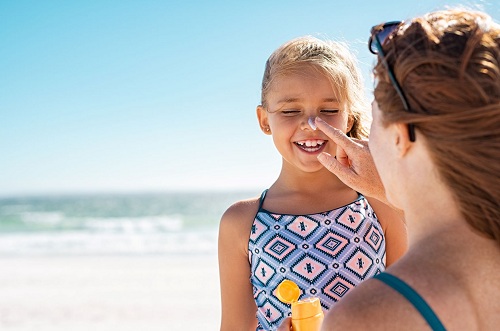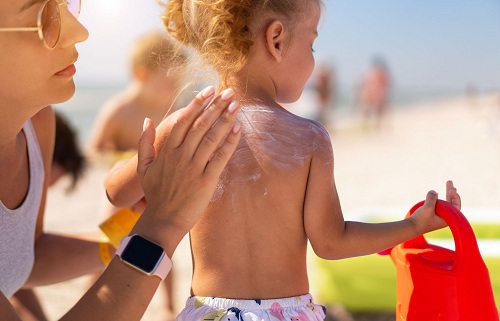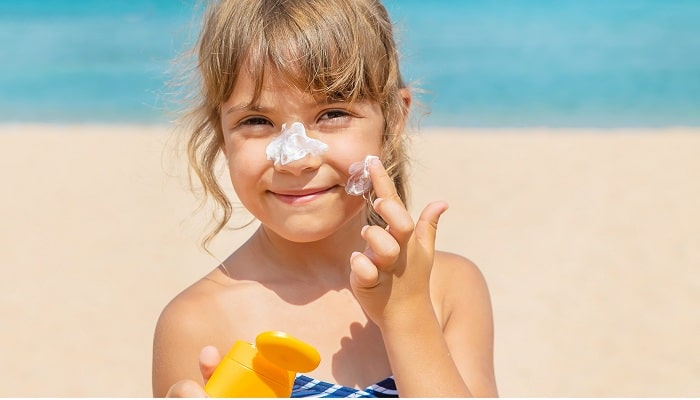Kids usually spend most of their time outside because having fun and playing outdoors are what makes them active. However, being exposed under the sun for a long time may cause skin ailments, especially in humid areas like Florida. This state is mostly surrounded by beaches, so its neighboring cities like Miami and Orlando often have high temperatures.
Children have very sensitive skin that’s more prone to sunburns. If your kid is experiencing skin problems, you may want to consider consulting a dermatologist in Orlando to ensure their safety.

Sunscreen as a Remedy
But besides consulting a medical professional, what parents can also do is apply a sunscreen to their children for additional protection when they’re outdoors. This basic practice would keep them from having burns and rashes.
However, not all sunscreens available on the market are safe to use. Some may work well, while some may unfortunately cause harm. That’s why it’s vital to choose a sunscreen which will be gentle to your child’s skin while keeping them safeguarded from the intense sunrays.
To help you in picking the right one, here are some tips you can follow:
-
Consider the SPF
Choose a sunscreen which has a Sun Protection Factor (SPF) of at least 15-30 SPF. It’s within this range that the product would have a mild effect to the skin. Sunscreens with higher SPFs don’t necessarily guarantee much protection, especially that it has more chemicals involved. Additionally, the ones with higher SPFs lasts the same period as a sunscreen with a low SPF, so the higher number doesn’t mean the better.
A general rule of thumb for sunscreens is to choose products that are relatively low in SPF, so it would provide a lighter feeling for the children.

-
Choose Mineral Sunscreen
Minerals are crucial for kids who have susceptible skin. Several pediatricians in Virginia and in other states in America believe there are two main ingredients considered to be effective and safe for sunscreen use–titanium dioxide and zinc oxide. These ingredients lessen the risk of toxic exposure since they’re sitting on top of the skin to block the rays of the sun instead of absorbing it.
Since researches are still assessing the efficacy and safety of particular chemicals found in sunscreens, it’s recommended that parents avail a product with the mineral components mentioned. See to it that you read the ingredients at the back of the product before purchasing.
Normal
0
false
false
false
EN-US
X-NONE
X-NONE
/* Style Definitions */
table.MsoNormalTable
{mso-style-name:”Table Normal”;
mso-tstyle-rowband-size:0;
mso-tstyle-colband-size:0;
mso-style-noshow:yes;
mso-style-priority:99;
mso-style-parent:””;
mso-padding-alt:0in 5.4pt 0in 5.4pt;
mso-para-margin-top:0in;
mso-para-margin-right:0in;
mso-para-margin-bottom:8.0pt;
mso-para-margin-left:0in;
line-height:107%;
mso-pagination:widow-orphan;
font-size:11.0pt;
font-family:”Calibri”,sans-serif;
mso-ascii-font-family:Calibri;
mso-ascii-theme-font:minor-latin;
mso-hansi-font-family:Calibri;
mso-hansi-theme-font:minor-latin;
mso-bidi-font-family:”Times New Roman”;
mso-bidi-theme-font:minor-bidi;}
-
Avoid Spray Sunscreen
Sprays can pose danger when not used correctly because it can be inhaled by the child. If possible, parents are advised not to spray sunscreens since improper handling of it may harm other parts of the body such as the eyes and mouth.
A lotion sunscreen tends to offer more protection since you can easily gauge how much you’re putting on the skin of your child. Many prefer sunscreen being applied by hand because typically, people are getting lesser out of sprayed products since they’re only using it for a few seconds. Applying by hand makes it stick longer to the skin.
-
Opt for a Water-Resistant Option
If your child is going underwater, it’s best to choose a water-resistant sunscreen. Sunscreen is considered water-resistant if its SPF level stays effective for 40 minutes in the water. A better quality sunscreen is one which can last after an hour of swimming. Since it eventually fades, you’ll need to apply more frequently if your child is taking a dip longer.

-
Choose a Sunscreen with a Broad Spectrum
A sunscreen which can protect your child from UVA as well as UVB rays is called broad-spectrum sunscreen. Both UVA and UVB rays can cause danger to the skin and prematurely age it, so it’s crucial to protect your child against these rays. Overexposure may result in skin cancer and sunburns.
To be sure, check the label of the sunscreen if there’s ‘broad-spectrum’ written.
Final Thoughts
There is no one size fits all when it comes to sunscreens, so make sure to take into account the above-mentioned tips in choosing the best product for kids. Sunscreen isn’t only used for the warm and beach weather since it’s still advantageous to apply regardless of the climate.
Remember that a sunscreen is just one of the many tools to protect the skin of your kids. It’s also important to keep an eye on the overall health condition of your child. Other factors such as using comfortable clothing and letting your child wear hat and sunglasses may considerably lessen their risk of having sunburn as well.
Â
Â



















